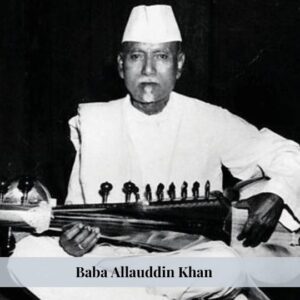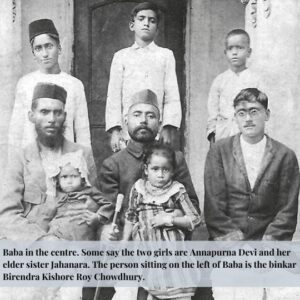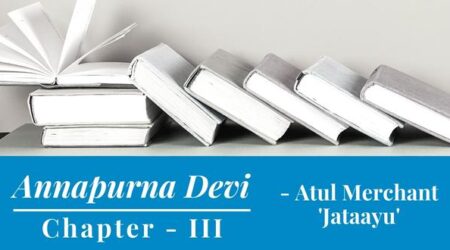Flashback – “Annapurna Devi”
- Atul Merchant ‘Jataayu’ | merchatul@gmail.com
In 1934, Uday Shankar was planning a tour of eighty-four cities in Europe and America with his ballet troupe. Timir Baran, who had been in charge of the music, expressed his inability to join them on this tour as he had signed a contract with New Theatres that made him music director for the film Devdas, starring K.L. Saigal.
‘Could you suggest a suitable substitute for you?’ a worried Uday Shankar asked. ‘I can’t think of anyone who could substitute me in Indian orchestral music,’ replied Timir. ‘But I know someone who is far superior to me. That is my guru, Baba Allauddin Khan.’ ‘I have heard of the great ustad, but tell me more,’ Uday Shankar asked curiously.
“Baba is a disciple of Ut. Wazir Khan, is one of the last direct descendants of the legendary Miyaan Tansen. Baba is not only a maestro of Indian music, but he is highly proficient in Western music as well, having learned Western classical violin and Western staff notations from Robert Lobo, a band conductor from Goa, the seat of Western music in India. Baba can play more than thirty musical instruments.” ‘Sounds too good to be true. Will he agree to join our troupe?’ Uday Shankar eagerly asked. ‘It may be difficult to convince him, but if he does join you, your orchestra will be unmatched.’ ‘Where is he now?’ ‘Presently, he is the court musician of Maihar, a princely state in the Bundelkhand Agency.’ ‘How can we persuade him to join us on this tour?’ ‘The easiest path would be to convince HH Brijnath Singh, the maharaja of Maihar, who is also Baba’s disciple.’
 Shortly after securing an appointment with Maharaja Brijnath Singh, Uday Shankar arrived at the ornate palace. ‘Saadar pranam to Maharaj.’ ‘Welcome, Udayji, my Gurubhai Timir Baran has told me many good things about your acclaimed ballets. Your adaptation of European theatrical techniques to Indian dance is pathbreaking. You are a true ambassador of the Indian culture.’ ‘With your blessings, the going has been good so far.’ ‘Tell me, what brings you to Maihar?’
Shortly after securing an appointment with Maharaja Brijnath Singh, Uday Shankar arrived at the ornate palace. ‘Saadar pranam to Maharaj.’ ‘Welcome, Udayji, my Gurubhai Timir Baran has told me many good things about your acclaimed ballets. Your adaptation of European theatrical techniques to Indian dance is pathbreaking. You are a true ambassador of the Indian culture.’ ‘With your blessings, the going has been good so far.’ ‘Tell me, what brings you to Maihar?’
‘Maharaj! We have planned a performance tour of eighty-four cities in Europe and America. I am seeking your help for the finest music for my ballets.’ ‘And how may I be of help to you?’ ‘Actually, I have come to seek your permission to borrow your court musician and guru, Acharya Allauddin Khan. If he takes charge of the music, our performances can scale trailblazing heights.’ ‘Oh! Then let me contribute my bit to your noble cause. I grant you my permission to take Acharyaji with you to America.’ ‘I am truly honored and grateful to Your Highness; my further plea is if Your Highness could be troubled to convey this idea to Acharyaji, he won’t refuse.’ ‘Ha, ha! Very smart indeed, but please realize that he is my guru. I can only request him. It is up to him to accept or reject your proposal. Take this note imprinted with the royal seal, addressed to guruji. My car will take you to his house.’
Uday Shankar and Timir Baran arrived at Baba’s house. ‘I guess we will have to wait for an hour or two,’ Timir Baran told Uday Shankar. ‘This is the time for Baba’s daily visit to Shārdā Ma’s temple.’ ‘Why would a Muslim go to Shārdā Ma’s temple?’ ‘He is as Muslim or Hindu as Saint Kabir was. His ancestors were Bengali Brahmins with their surname Devsharman. In the Battle of Plassey, they fought on the side of Nawab Sirajud- Daulah against the British. Betrayed by Mir Jafar, the then commander of the Nawab’s army, Siraj-ud-Daulah lost the battle on 23 June 1757.
Baba’s ancestors then joined Bhavani Pathak, the Robin Hood of Bengal, who was the leader of the Sanyasi Movement in Bengal. Bhavani Pathak along with Devi Chowdhurani had a large following in the downtrodden society. In 1787, Bhavani Pathak was killed in a skirmish with the Company’s troops. Baba’s ancestors had to flee and seek asylum in a native kingdom ruled by another nawab, who had a precondition that all the asylum seekers should convert to Islam. Baba’s ancestors converted to Islam, but behind closed doors, they continued practicing Hinduism. They eventually settled in Shivpur.’
‘Does he visit the Shārdā Ma temple for two hours?’ ‘Yes, Maihar boasts of the world’s only Goddess Shārdā temple. It is on top of Trikut hill. Every day, come rain or shine, Baba climbs 1063 steps, scaling the height of 600 feet, to pay his obeisance to Shārdā Ma. In the evenings, Baba visits the local mosque to offer namaaz.’
‘But tell me, how do they allow a Muslim to enter the temple and perform pooja?’ ‘There is a dramatic story behind it.’ ‘Please tell me, we have enough time.’ ‘Baba was in Rampur under the tutelage of Ut. Wazir Khan. A time came when Wazir Khansaheb concluded his training, saying there was nothing more left with him to teach Baba. He advised Baba to become a court musician of a rich princely state. For a musician of Baba’s caliber, there were numerous options available. However, when the name of Maihar came up, the only question Baba asked was, ‘Maihar? The same place which has the famous Shārdā Ma temple?’ When the answer was yes, Baba instantly opted for it, without caring that most of the other available options were states far richer than Maihar.’ ‘He must be either a simpleton or a saint to ignore the monetary considerations.’
‘I guess he is both,’ Timir Baran said with a smile. ‘After arriving at Maihar, Baba’s first agenda was to visit Shārdā Ma’s temple. However, the priest in charge disallowed Baba from entering the temple. Baba paid his obeisance to Shārdā Ma without entering the temple and went away. ‘The next day, the priest came to the maharaja’s palace and said, ‘Maharaj, yesterday, your newly appointed Muslim musician tried to enter the temple. As per our tradition, I disallowed him to enter. However, Shārdā Ma came in my dreams last night and scolded me for driving away Her param bhakt [supreme devotee].’
 ‘Thenceforth, with the consent of His Highness, not only was Baba allowed to enter the temple but he was also allowed to enter the garbha griha [sanctum sanctorum] to perform a pooja. Thus, it became Baba’s daily ritual.’ Uday Shankar and Timir Baran reached Baba’s home, and as they waited in the living room, they heard the sound of the Sitar from the adjoining room. ‘Beautiful! Who is playing?’ ‘Baba’s eight-year-old daughter, Annapurna.’ ‘Unbelievable! How can such a young child play so well?’ Uday Shankar peeped through the door ajar, and indeed, a small girl was practicing the Sitār inside the room. ‘Well,’ Timirbaran said with a smile. ‘She has truly inherited Baba’s genes.’ ‘How did HH Brijnathsinghji become Baba’s disciple?’
‘Thenceforth, with the consent of His Highness, not only was Baba allowed to enter the temple but he was also allowed to enter the garbha griha [sanctum sanctorum] to perform a pooja. Thus, it became Baba’s daily ritual.’ Uday Shankar and Timir Baran reached Baba’s home, and as they waited in the living room, they heard the sound of the Sitar from the adjoining room. ‘Beautiful! Who is playing?’ ‘Baba’s eight-year-old daughter, Annapurna.’ ‘Unbelievable! How can such a young child play so well?’ Uday Shankar peeped through the door ajar, and indeed, a small girl was practicing the Sitār inside the room. ‘Well,’ Timirbaran said with a smile. ‘She has truly inherited Baba’s genes.’ ‘How did HH Brijnathsinghji become Baba’s disciple?’
‘HH Brijnathsingh was looking for someone who could play each instrument in his extensive collection. It was Jagat kishorji, zamindar of Muktagachha, who recommended Baba to Brijnathsinghji as Baba had proficiency in playing more than thirty musical instruments. When Baba Allauddin Khan first arrived at the Maihar palace in 1918, he was escorted to the room containing all these instruments. The minister asked Baba to play as many of them as he could. One by one, Baba played them all. From the adjoining room, Brijnathsinghji was listening attentively. Impressed by his talent, Brijnathsinghji invited Baba to perform at
the royal court the next evening. ‘The court was filled with an audience when Baba started playing the ālaap of Raag Shree. Within about five minutes, HH Brijnathsinghji got up from his throne and walked away hurriedly. All including Baba were in shock. Despite the insult, Baba continued playing. ‘When Baba concluded his rendition, HH Brijnathsinghji returned to the court with the paraphernalia of a pooja ritual and pleaded with Baba to accept him as his disciple.
Baba in his terse manner said, “In the middle of the rendition you walked away showing utter disrespect for music. How can I accept you as my disciple?” ‘Brijnathsinghji, with folded hands, said, “I beg your pardon for my action. Within the first few minutes of your rendition, I became so emotional my tears betrayed me. No king sheds tears in front of his subjects; therefore, I had to walk away.”
Continue …Stay tuned @ Swar Aalap DIGITAL _ Book Shelf








Leave a Reply